
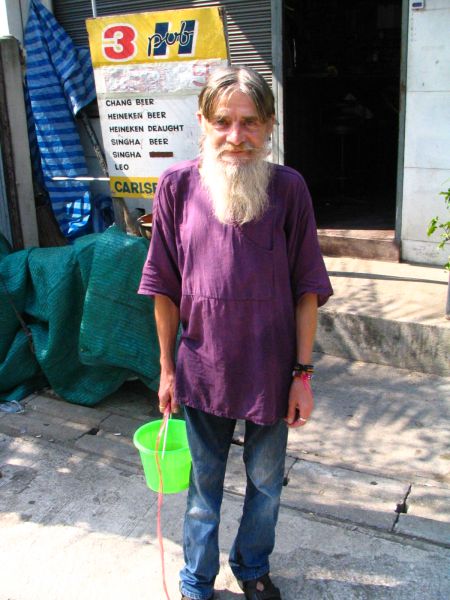
Today is Wednesday. As far as I know, this is also the first official day of Songkhran, the Thai New Year. In the morning I have a meeting with Helen in the office of the International Alliance. The office is outside of Chiang Mai and she has explained to me yesterday how to get there. However, it takes me more than 30 minutes to find the office. A number of children splashes significant amounts of water at me on my way through the city center. I like it, and by now I can manage to ride on the wrong side of the road.
Finally I find the office. We spent the morning with discussions. Later we leave to visit a party of indigenous peoples from Burma (Myanmar) who fled from their evil government to Thailand. Although Helen speaks Thai very well it takes us quite some time to find the place. Here I meet again with Chris, his wife, Jannie and Chingya. The party takes place in some sort of garden and there are about 40 or 50 people, including a life band. Most people are from Burma.
People enjoy themselves, some have drunken significant amounts of beer already, and a number of children have a lot of fun splashing water at each other and everybody else. I get to talk to some people and listen to the music and more generally enjoy being here among friendly folks.
Jannie and Chingya singing.

Chingya singing.

Indigenous refugees from Burma, slightly drunk.

Children playing with water. By now I am wet all over, like everybody else.
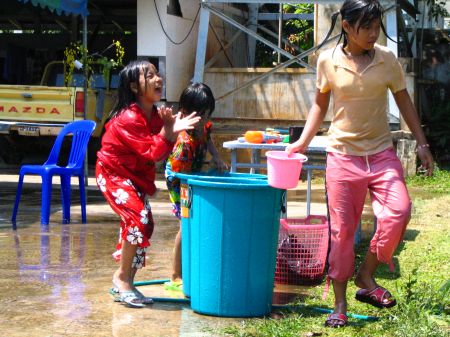
It is early afternoon when we decide to move to the town center and join the Songkhran celebration. First we ride to Chris’ house, where I try to put all my belongings into plastic bags. The roads are very crowded when we come closer to the town and water is splashed at us quite frequently. The inner city is closed and at some point we leave the bikes and walk.
I knew that splashing water at other people is what Songkhran is all about and that this practiced particularly in Chiang Mai. However, I am surprised about the number of people and amounts of water involved. It seems everybody is joining, locals together with Thais from other places and foreigners. The road is wet everywhere, almost everybody seems to have a water canon and trucks are driving around with huge barrels of water and people splashing it all over.

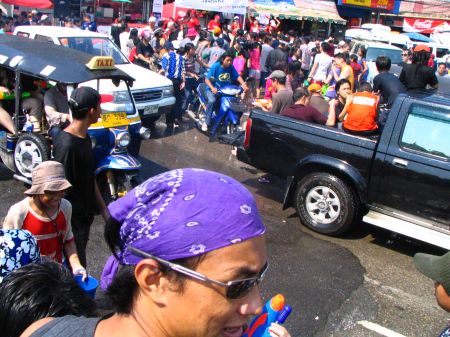
This police man has not only wrapped his radio in plastic, but also his gun.

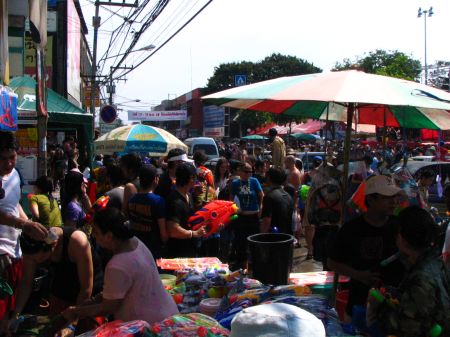

Jannie and Chingya, entirely wet.

Chris and his wife, wet, too.

This moat surrounds the city center of Chiang Mai. The water inside is not particularly clean, but this does not prevent people from swimming in it, or from using it to make other people wet.

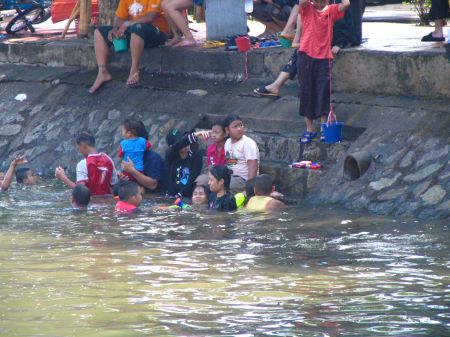
By now I am getting a bit concerned that my camera might get wet. We decide to have some food at the roadside and I run home to leave my bag and camera there. I realize that water is standing in my camera bag and hope the camera will survive. Then I go back to meet the others.
Obviously I cannot take any pictures anymore. We continue to walk through the crowd, now armed with water canons and buckets. I realize how much more fun it is to make other people wet, rather than being on the receiving end only.
At some point we come across on of the four gates of the old city wall. A huge procession takes place, people of all ages partly in traditional costumes pass by with nicely decorated cars with Buddhas on the back, people carry huge flags, dance, sing and shout blessing over loudspeakers. The whole event is quite fascinating, particularly given the environment in which it takes place. There are tons of people battling each other with water canons in very casual dress, next to it is a stage with loud techno music and many people dancing, and here is what appears to be a time honored tradition of celebrating the New Year. These are quite different manifestations of the same event, and they do not seem to be at odds with each other. I also note that this event is celebrated by locals and foreigners together and equally enthusiastically.
Everybody has joined the celebration.

We stop by the market where Chingya buys a selection of fried insects, like worms, and grasshoppers. I try, reluctantly at first but then find that this stuff is fairly tasty. Than we join the crowd again, at a place next to the moat, and battle each other and everybody else with water. We spent quite some time doing that and it is getting dark when we decide to go home.
I meet with Chingya in the evening. There are still pockets of people splashing water. There is a stage close to one of the gates were traditional and not so traditional performances take place. We spend some time watching.
New Year Performance.
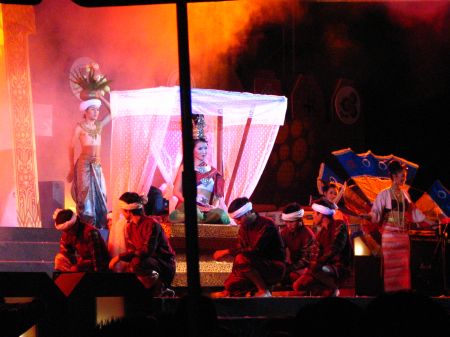
Later we ride to the night market where we have some refreshment and talk. Many of Chingya’s family members were involved in the struggle against the Indian government and his father was killed by the Indian army. As I mentioned, I have met Chingya’s uncle in Geneva and found him to be quite an interesting person. So is Chingya. He has studied the law in India and has worked in Delhi for a lawyer organization that supported HIV/Aids affected people. Now he works as Campaign and Policy Advocacy Coordinator in AIPP. Later we walk through the market and still later hit a bar. I learn a lot about Naga in India, about AIPP and indigenous peoples in the region. It is already past midnight when we go home.
Happy New Year!
On a more serious note, there is no reason for you to follow this, and there are a million other people missing but there may be one we can help. Check the URL. Find Eddie Gibson (http://www.eddiegibson.net)…spread the word. It’s real. http://news.bbc.co.uk/2/hi/uk_news/england/4455477.stm